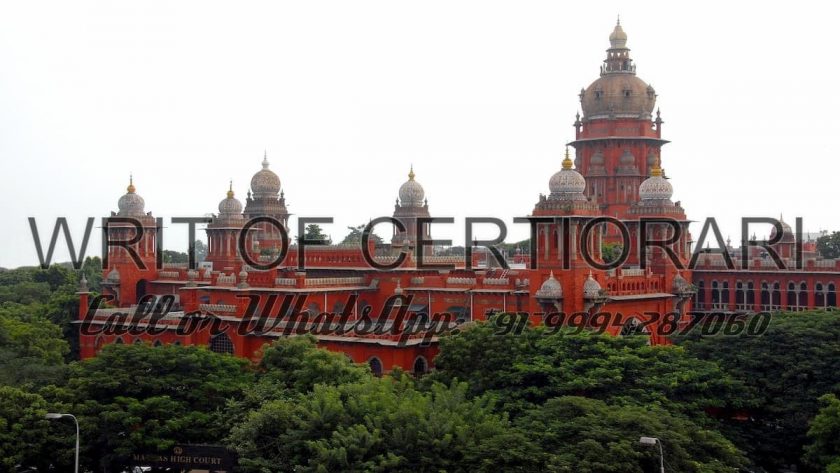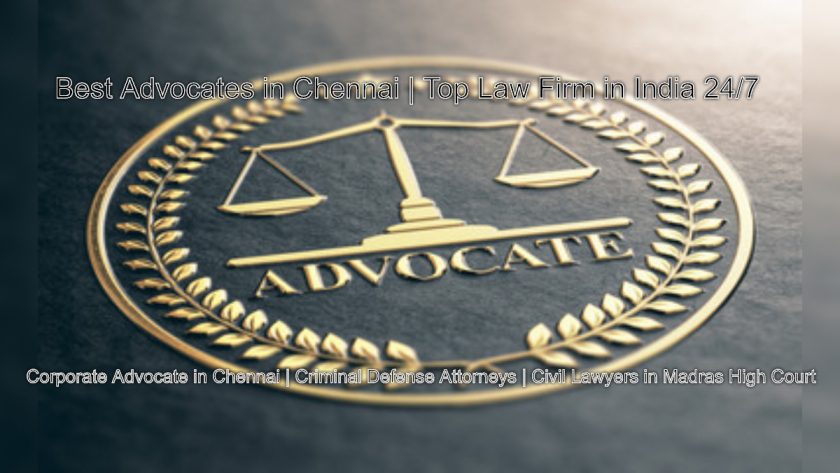Find and identify the Best Lawyers firstly for Writ of Certiorari filing in Chennai Tamil Nadu India. Moreover, Choose Top Advocates for Legal Consultation and Guidance to understand and process the case. Advocate Saravvanan Rajendran Law Chamber [askadvocates.com] is indeed one of the Best Law Firm for Writ of Certiorari.
Unlocking the Power of Certiorari: Your Path to Legal Clarity
In the labyrinthine realm of legal intricacies, where every decision carries the weight of justice, the Writ of Certiorari emerges as a beacon of hope, ensuring that the rule of law prevails. When you find yourself in the bustling legal landscape of Chennai, two names stand out as the epitome of legal prowess – AskAdvocates Law Chamber and Rajendra Legal Consultancy. These aren’t just Senior Lawyers or Top Rated Advocates; they represent the very essence of what it means to be the Best Ranking Attorneys in Chennai, nestled within the backdrop of Top-Notch Law Firms in India.
Best Lawyers for Writ of Certiorari
Attention: Picture this – you’re entangled in a legal web, seeking clarity and justice. It’s in these moments that the Writ of Certiorari takes center stage, promising a thorough review of judicial decisions. But the true magic lies in having seasoned legal champions like AskAdvocates Law Chamber and Rajendra Legal Consultancy by your side.

Interest: What sets these legal luminaries apart is their unwavering commitment to your cause. With their 24×7 accessibility and decades of experience, they not only pique your interest but also instill confidence that your pursuit of justice is in the right hands.
Desire: As you delve deeper into this blog, you’ll discover how these legal stalwarts have harnessed the power of Certiorari to champion the cause of justice in Chennai. Your desire for legal clarity and fair verdicts will find its answer in the expertise of AskAdvocates Law Chamber and Rajendra Legal Consultancy.
Action: The path to legal clarity starts here. Explore the world of Certiorari and witness how these legal juggernauts employ it to safeguard your rights and seek justice in the bustling metropolis of Chennai.
Introduction: Certiorari, firstly, A word that appears as at home in the center of a tongue twister of moved as a meddlesome way by a Constitutional Court.
Hari Vishnu vs. Ahmed Ishaque
In the case of Hari Vishnu v/s Ahmed Ishaque, the Supreme Court ruled that no blunder can be presumed as a factual mistake. On the substance of record if it was not obvious. And required an assessment and contention to set up it in any case. An error of law which is clear on the essence of the record can be rectified by a writ of certiorari in addition. However not a blunder of reality, howsoever grave it might seem, by all accounts, to be.
The purpose behind the principle is that the court giving a writ of certiorari acts in an administrative jurisdiction. In like manner, it can’t substitute its own choice on the benefits of the case. Of course, the second-rate court or council must agree to the provided guidance. Negligence of guideline of characteristic justice.
Province of Bombay vs. Khushaldas
For the situation, it was held that at whatever point anyone of an individual having lawful power. To decide addresses influencing the rights of subjects. And having the obligation to act judicially acts in the abundance of their legitimate position, a writ of certiorari will lies. It doesn’t mislead expel only clerical acts. In fact, it is to evacuate or drop leader authoritative acts.
Articulation legal acts incorporate the activity of quasi-legal capacities
Writ lies on Judicial bodies one of the fundamental standards. Concerning the giving of a writ of certiorari is that the writ can be profited of just to evacuate. Meanwhile, it is to meditate upon the legitimacy of legal acts. The articulation legal acts incorporate the activity of quasi-legal capacities. Those are all by authoritative bodies or specialists or people obliged to exercise such capacities. And this is utilized interestingly which are pastoral acts.
Authority is to act judicially
The Supreme Court has set down two suggestions for determining whether an authority is to act judicially
1. If a resolution engages a position to choose questions emerging out of guarantee made by one party under the rule. which another party contradic the guarantee. At that point at first sight and without anything in the rule to the opposite is the obligation of the power to act judicially. And the choice of power is a quasi-legal act.
2. if a statutory authority can do any demonstration which will preferentially influence the subject. At that point, although two parties are not separated from the position, the last assurance of power is quasi-legal. The authority is required by the sculpture to act judicially. Grounds determine when the writ can be issued.
Legal and quasi-legal bodies
The writ of certiorari can be given to legal and quasi-legal bodies on the accompanying grounds.
1. where there is a need or abundance of jurisdiction. Authorities issue the writ of certiorari to a body performing legal or quasi-legal functions. As when a substandard court or council acts without jurisdiction. Or an overabundance of it or neglects to practice it.
The need for jurisdiction may emerge from the idea of the topic. So the second rate court has no power to enter on the requestor upon some piece of it.
![Find and identify the Best Lawyers for Writ of Certiorari filing in Chennai Tamil Nadu India. Choose Top Advocates for Legal Consultation and Guidance to understand and process the case. Advocate Saravvanan Rajendran Law Chamber [askadvocates.com] is one of the Best Law Firm for Writ of Certiorari. Find and identify the Best Lawyers for Writ of Certiorari filing in Chennai Tamil Nadu India. Choose Top Advocates for Legal Consultation and Guidance to understand and process the case. Advocate Saravvanan Rajendran Law Chamber [askadvocates.com] is one of the Best Law Firm for Writ of Certiorari.](http://askadvocates.com/wp-content/uploads/2016/10/Financial-and-banking-Litigation-Lawyers.jpg)
The need for jurisdiction may likewise emerge from nonappearance of some primer continuing. Or upon the presence of some specific realities which are important to the activity of the court’s power. And the court wrongly accepts that the specific condition exists.
2. For adjusting blunder of law clear on the substance of record. Courts determine if a mistake of law, apparent on the record’s face, warrants a writ. They don’t correct factual errors, though. Each case’s facts help courts decide what constitutes a clear error of law.
Nature and scope
Certiorari is not solely issued to correct executive acts; however, its application isn’t strictly limited. Generally, if the act performed by the inferior body is judicial rather than ministerial, certiorari is applicable. This remedy is based on the supervisory authority wielded by the Sovereign’s Superior Courts, notably the Court of King’s Bench. This principle extends to other parts of the King’s dominions and operates within defined limits in British India.
T.C. Basappa Vs. T. Nagappa and Anr.
The Constitution Bench in T.C. Basappa Vs. T. Nagappa and Anr., (1955) 1 SCR 250. It is held that certiorari might be and commonly granted when a court has acted.
(i) without jurisdiction, or
(ii) in an overabundance of its jurisdiction.
Outrageous negligence of the standards or strategy
The need for jurisdiction may emerge from the idea of the topic of the procedures. Or from the nonappearance of some primer procedures or the court itself might not have been legitimately comprised. Or experiencing certain incapacity because of incidental conditions. Certiorari may likewise issue if the court or council. However skillful has acted in outrageous negligence of the standards or strategy. Or disregarding the standards of normal equity where no specific methodology is recommended.
Dismissal of the provisions of law
A mistake in the choice of assurance itself may likewise be manageable to a writ of certiorari. It is subject to the accompanying components being accessible if the blunder is show and obvious on the essence of the procedures. For example, when it depends on away from or dismissal of the provisions of law. However, a minor wrong choice isn’t agreeable to a writ of certiorari.
Any power or assortment of people established by law. Or having a lawful position to settle upon addresses influencing the rights of a subject. And charged with an obligation to act judicially or quasi-judicially is amiable to the certiorari jurisdiction of the High Court. The procedures of legal courts subordinate to the High Court can be exposed to certiorari.
Declining the writ of certiorari
However accessible, certiorari jurisdiction shouldn’t be routinely exercised. The High Court may decline the writ if no injustice occurred. In practicing the certiorari jurisdiction the strategy conventionally followed by the High Court. It is to order the mediocre court or council to ensure its record. Or procedures to the High Court for its examination to empower the High Court. To decide if on the substance of the record the sub-par court has submitted any of the previous blunders occasioning disappointment of justice.
Read More
- WRIT OF PROHIBITION: How to find the Best Lawyers?
- The WRIT OF QUO WARRANTO
- WRIT OF MANDAMUS: How to find the Best Law Firm?
- Agency law
- TRESPASS

Contact Top Advocates for Writ of Certiorari in Chennai
Call or WhatsApp: +91-9994287060 to contact Top Advocates for Writ of Certiorari. Just keep in touch and make an Appointment for a Legal Advice and thereafter get the whole Fees details to file a Writ of Certiorari in Madras High Court or Supreme Court.
Follow us: https://www.facebook.com/askadvocates/
Frequently Asked Questions [FAQ] Writ of Certiorari
What is the object Of Certiorari?
The object of the writ of Certiorari is to keep substandard Courts. and quasi-legal specialists inside the constraints of their jurisdiction. And on the off chance that they demonstrate in the abundance of their jurisdiction their choice. It can be suppressed by prevalent courts by giving this writ.
What are the conditions for the Writ of Certiorari?
The writ of certiorari can be given if the accompanying conditions are satisfied –
1) The legal or quasi-legal body must have a lawful position.
2) Such a position must be the power to decide addresses influencing the rights of subjects.
3) It must have obligation to act judicially, and
4) It is more likely than not to act in an overabundance of its position.
What are the grounds of Certiorari writ?
a) The error of Jurisdiction: At the point when a Subordinate Court or council acts without jurisdiction. Or in the abundance of its jurisdiction or neglects to practice jurisdiction vested in it by law. A writ of Certiorari might be given against it.
b) Judicial Fact: The reality or realities whereupon a managerial organization’s capacity. To act depends can be called as a jurisdictional reality. If the jurisdictional realities don’t exist the court or council can’t act.
c) Violation of Natural Justice: A writ of Certiorari can be given when there is an infringement of standard of normal equity.
What are the Significant Conditions for Certiorari?
For the Writ of Certiorari the accompanying conditions ought to be satisfied:
a) The body or individual has a legitimate position.
b) Such authority is identified with deciding those inquiries which influence the rights of the individuals.
c) Such a body or individual must act judicially in doing its capacities.
d) Such an individual or body has acted in an abundance of their jurisdiction or lawful power.
e) When all conditions are met, only then can a Writ of Certiorari be issued. It can be directed against the body or individual exceeding their jurisdiction.
What is the Rule of Proceeding in Personam?
In the cases identified with the Writ of Certiorari. The individual who is distressed by the unfair exercise of jurisdiction by the court ought to bring the request under the Court. In such a manner, this Writ is not quite the same as the Writ of Habeas Corpus. Habeas Corpus can be applied even by a non-abused individual. And the courts will acknowledge such an application.
The procedure if there should arise an occurrence of Certiorari is a unique continuing under the unrivaled court. It can be started by a solicitor under the watchful eye of the High Court under Article 226. And under the watchful eye of the Supreme Court under Article 32 of the Indian Constitution.



